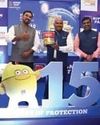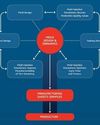يحاول ذهب - حر
Digital Transformation in Plastics
Aug-Sept 2021
|ET Polymers
Automation in the plastics industry is becoming more complex, the pace of innovation is accelerating, and competitive pressure is increasing. Open and safe automation makes it possible to combine traditional mechanical engineering with the latest Industry 4.0 technologies – Lets take a look at how Industry 4.0 is transforming the plastics sector

The plastic industry in India is believed to have come to international recognition in 1957, with the production of polystyrene. Today, the industry has greatly diversified, spans the country and hosts more than 2,000 exporters. It employs about 4 million people and comprises more than 30,000 processing units, 85-90 per cent of which are small and medium-sized enterprises.
According to an industry report by McKinsey, the engineering plastics market in Asia-Pacific is expected to achieve a growth rate at a CAGR of 5.7 per cent over the forecast period of 2018-2023. The study further estimates that polyethylene terephthalate (PET) resins are projected to stand out in the segment, with a 51 per cent share in the engineering plastics’ product share and a growth of 6.6 per cent over the next five years.
Plastics will be the fastest-growing part of the chemical industry through 2030 while considering factors such as economic recovery, the end of the pandemic and other variables. Demand for plastic, in part, could also be attributed to public perception of it as being COVID-19 repellent. The reason may be that masks, gloves and other protective equipment are made from plastics, as are products like delivery packages and soda bottles. I
In FY20 (till January 2020), plastic exports stood at US$ 7.045 billion with the highest contribution from plastic raw materials at US$ 2.91 billion; plastic sheets, films, and plates at US$ 1.22 billion; and packaging materials at US$ 722.47 million. (Source: Directorate General of Commercial Intelligence and Statistics (DGCIS)
هذه القصة من طبعة Aug-Sept 2021 من ET Polymers.
اشترك في Magzter GOLD للوصول إلى آلاف القصص المتميزة المنسقة، وأكثر من 9000 مجلة وصحيفة.
هل أنت مشترك بالفعل؟ تسجيل الدخول
المزيد من القصص من ET Polymers

ET Polymers
The Changing Face Of Mobility
A brief look at the salient points on how plastics is transforming automotive manufacturing
6 mins
Aug-Sept 2021

ET Polymers
Nippon Launches Weatherbond PRO
Nippon Paint (India) Private Limited (Decorative Division) Asia’s leading paint manufacturer launched the advertising campaign for Weatherbond PRO – the high durable exterior emulsion offering up to 15 years of protection against extreme climate conditions like prolonged exposure to heat, and heavy spells of rain. Based on extensive research done by Nippon Paint’s R&D team, this product was developed for customers who need advance protection for their home exteriors in terms of extended fresh look, strong waterproofing and protection from Algal and Fungal attacks.
1 mins
Aug-Sept 2021

ET Polymers
Low-Pressure Molding Adopted Across Industries
Henkel’s Technomelt Low-Pressure Molding technology meets demands for encapsulation of electronics and medical components
4 mins
Aug-Sept 2021

ET Polymers
TotalEnergies and Jindal Films To introduce Certified Circular Polypropylene
TotalEnergies and Jindal Films have joined forces to produce more sustainable flexible food packaging and labels. Using advanced recycling technology from Plastic Energy, TotalEnergies will supply Jindal Films with Certified Circular Polypropylene produced from postconsumer plastic waste. This new value-chain collaboration will divert plastic waste currently destined for incineration and landfill because it is too complex to recycle through existing schemes.
2 mins
Aug-Sept 2021

ET Polymers
Lenzing's VEOCEL™ Brand Launches Hydrophobic Lyocell Fibres With Dry Technology
In its quest to drive greater sustainability in the personal care and hygiene industry, the VEOCEL™ brand has launched a new offering: VEOCEL™ branded lyocell fibres with dry technology which are naturally smooth and gentle on skin, ensuring comfort for sensitive skin. Absorbent hygiene products are an indispensable part of many consumers’ lives and are relied upon daily. As these are essential items, it is important that they should offer maximum comfort and relief to the user. This is demonstrated by the new VEOCEL™ branded lyocell fibres which have the capacity to provide a high level of comfort, softness and dryness, when applied in these types of products.
1 mins
Aug-Sept 2021

ET Polymers
Simulating Injection Molding for Efficiency
Producing high-quality, plastic injection-moulded parts more quickly and cost-effectively has become a critical factor for manufacturing success in today’s global market. Instead of engaging in slow, expensive prototype iterations and test cycles to satisfy manufacturing requirements, designers, mold makers, and manufacturing professionals can leverage SOLIDWORKS® Plastics mold-filling simulation software to optimise parts for manufacturability, refine tooling to improve quality and shorten cycle times to reduce manufacturing costs
10 mins
Aug-Sept 2021

ET Polymers
Leveraging 3D Printing for optimised Injection Molds
A guideline from Formlabs on the factors to consider before using stereolithography (SLA) 3D printed molds in the injection molding process to lower costs, reduce lead times, and bring better products to market
8 mins
Aug-Sept 2021

ET Polymers
iglidur I151 for FDA-compliant, Detectable, Wear Resistant Parts In Food Technology
igus has developed a blue, food-compatible tribo-filament for cost effective 3D printing of special parts. iglidur I151 is blue, prints easily, and has an optimal coefficient of friction and wear. The new tribo-filament is a refinement of the easy-to-machine igus iglidur I150 all-rounder filament. Because it is blue, it can be used to manufacture special parts that are optically detectable in the food industry. Food compatibility according to the FDA and to EU Regulation 10/2011 also qualifies the high-performance polymer for use in the food and cosmetics industries.
1 mins
Aug-Sept 2021

ET Polymers
Exceptional Warpage Control
SABIC’s new LNP™ THERMOCOMP™ compounds deliver exceptional warpage control
5 mins
Aug-Sept 2021

ET Polymers
Digital Transformation in Plastics
Automation in the plastics industry is becoming more complex, the pace of innovation is accelerating, and competitive pressure is increasing. Open and safe automation makes it possible to combine traditional mechanical engineering with the latest Industry 4.0 technologies – Lets take a look at how Industry 4.0 is transforming the plastics sector
8 mins
Aug-Sept 2021
Translate
Change font size
